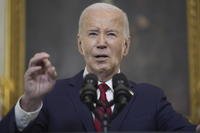The U.S. Defense Department's Tricare program may increase over time the number of urgent care visits some beneficiaries can access without a referral, officials said.
Starting May 23, users of the health care program under the active-duty and retiree Prime plans, as well as Tricare Prime Remote and Tricare Young Adult users, will be able to access two urgent care visits per person every year without first receiving authorization from a provider or Tricare nurse advice line.
The change is part of a three year pilot program ordered last year by Congress. Those who use urgent care more than twice per year must get pre-approval or pay for the visit out of pocket.
Some potential users have criticized the plan, saying that two non-approved visits per year won't be enough to truly ease the stress seeking a referral can cause. But Tricare officials said they will constantly reevaluate their visit cap, and can expand the program if they see a need.
"For the three-year pilot, we do plan to make adjustments on at least an annual basis," Navy Capt. Edward Simmer, a Tricare deputy director, told Military.com in an interview on Wednesday.. "So if we see a lot of people are using up their two visits early in the year, we're going to adjust that."
Simmer said the cap was based off a pilot program run for the Coast Guard in the south region that ended last May. Users in that trial were permitted four non-referral urgent care visits a year, but less than 5 percent of patients used more than two visits, he said. As that test was wrapping-up, Congress worked to include the new pilot program in legislation for 2016. Absent of that order, Simmer said, the system would still likely have run the upcoming test.
"I think it does make sense now to test this on a much larger scale," he said. "Let's learn how it's going to work best."
Patients are still encouraged to call the Tricare nurse advice line to seek authorization when they can in an effort to help them understand whether or not they actually need urgent care. If they receive pre-approval to visit and urgent care, their visit will not be counted against their allotment.
Officials said the regional contractors, which will manage each person's urgent care use, have been instructed to develop a system that can match urgent care use to a database tracking who has received referrals and who has not.
To receive a urgent care referral, users who are seen in military treatment facilities must call the Tricare nurse advice line. Those seen by civilian providers must receive a referral from their primary care provider. Urgent cares used under both the referral and non-referral program must be Tricare authorized.
-- Amy Bushatz can be reached at amy.bushatz@military.com. Follow her on Twitter at @amybushatz.




























